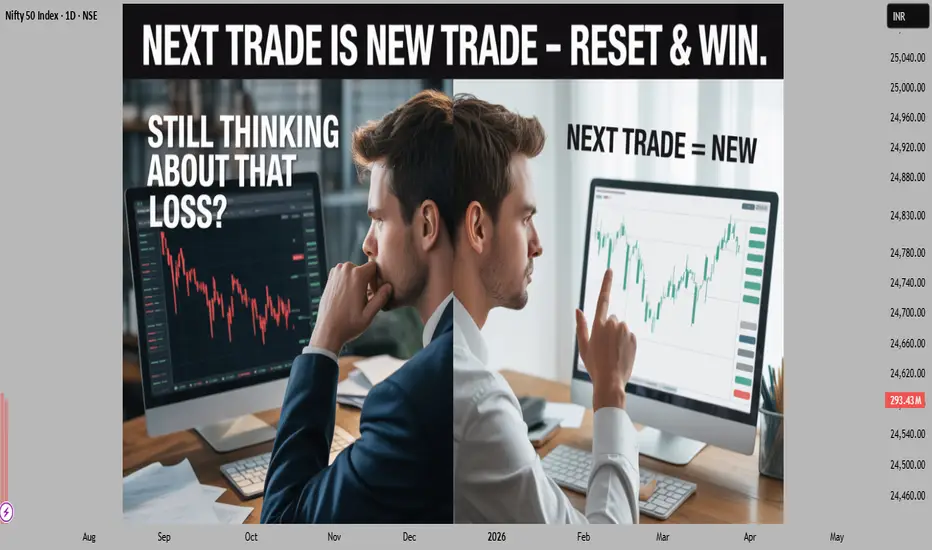Hello Traders!
One of the most powerful shifts in trading psychology is learning to treat each trade as a completely independent event. Past losses or wins shouldn’t influence your next decision. But for most traders, emotions from the last trade cloud judgment. That’s why today, we’ll dive deep into the “Next Trade is New Trade” mindset — and how to build it into your trading system.
Why This Mindset Matters
How to Practice the “New Trade” Approach
Rahul’s Tip
Your last trade is history. Whether it was a loss or win, it doesn’t define your next one. Focus on the process — not the outcome.
Conclusion
Developing the “Next Trade is a New Trade” mindset isn’t just a concept — it’s a skill that separates emotional traders from consistently profitable ones. Practice detachment, follow your system, and let each trade be judged only on its own merit.
Do you let your last trade influence your next? Be honest — and drop your thoughts in the comments! Let’s grow together.
One of the most powerful shifts in trading psychology is learning to treat each trade as a completely independent event. Past losses or wins shouldn’t influence your next decision. But for most traders, emotions from the last trade cloud judgment. That’s why today, we’ll dive deep into the “Next Trade is New Trade” mindset — and how to build it into your trading system.
Why This Mindset Matters
- Break Free from Emotional Baggage: A bad trade can lead to revenge trading, while a good trade may bring overconfidence. This mindset helps you start fresh.
- Consistency Over Drama: Great traders don’t ride emotional highs and lows. They focus on the next high-probability setup — nothing more, nothing less.
- Reset Your Psychology: Like an athlete resetting between plays, traders must reset mentally between trades to stay sharp.
How to Practice the “New Trade” Approach
- Use a Checklist Before Every Entry: Let your setup criteria speak — not your emotions. If your edge is present, take the trade. If not, skip it.
- Don’t Chase Losses or Celebrate Wins Too Long: Journal your trade, learn from it, and move on. Don’t carry emotional residue forward.
- Keep Trade Sizes Consistent: Avoid increasing risk to “make back” losses or doubling down on confidence.
- Close the Tab, Clear the Mind: After closing a trade, take a 2-5 minute break. It’s a mental reset button before the next opportunity.
Rahul’s Tip
Your last trade is history. Whether it was a loss or win, it doesn’t define your next one. Focus on the process — not the outcome.
Conclusion
Developing the “Next Trade is a New Trade” mindset isn’t just a concept — it’s a skill that separates emotional traders from consistently profitable ones. Practice detachment, follow your system, and let each trade be judged only on its own merit.
Do you let your last trade influence your next? Be honest — and drop your thoughts in the comments! Let’s grow together.
Premium Signals: 77% accuracy in Intraday & Positional trades for Stocks, Nifty, Bank Nifty, Gold, Silver & Crypto. Take demo & decide — most traders don’t leave after joining.
Free Demo: wa.me/919560602464
Free Telegram: spf.bio/c1lkb
Free Demo: wa.me/919560602464
Free Telegram: spf.bio/c1lkb
相關出版品
免責聲明
這些資訊和出版物並非旨在提供,也不構成TradingView提供或認可的任何形式的財務、投資、交易或其他類型的建議或推薦。請閱讀使用條款以了解更多資訊。
Premium Signals: 77% accuracy in Intraday & Positional trades for Stocks, Nifty, Bank Nifty, Gold, Silver & Crypto. Take demo & decide — most traders don’t leave after joining.
Free Demo: wa.me/919560602464
Free Telegram: spf.bio/c1lkb
Free Demo: wa.me/919560602464
Free Telegram: spf.bio/c1lkb
相關出版品
免責聲明
這些資訊和出版物並非旨在提供,也不構成TradingView提供或認可的任何形式的財務、投資、交易或其他類型的建議或推薦。請閱讀使用條款以了解更多資訊。
